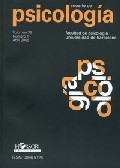Aquiescence produce methods bias?: A study across self-esteem scales
Keywords:
efecte de mètode, autoestima, anàlisi factorial confirmatòria, ítems negatius, efecto de método, análisis factorial confirmatorio, ítems negativos, method effects, self-esteem, confirmatory factor analysis, negatively worded itemsAbstract
Self-esteem scales very often present items in the trait direction and items in the opposite direction. This practice has become common because of the presence of aquiescence, or the tendency to answer affirmatively, no matter what the item content is. Empirical evidence demonstrates negatively worded items use generates method variance creating method effects not associated with the traits of interest. In this sense, the present research pretends to extend the evidence and the study of the method effect related to negatively worded items in the self-esteem scales context. More specifically the presence of method effects is studied, not only when self-esteem is tested as a global trait, but also when self-esteem specific domains are measured as either traits or states, in different kinds of samples. To conduct this study, two samples were assessed: one consisting of 592 adolescents, and the other one composed of 295 batterers. Three self-esteem scales were used: the Rosenberg’s Self-Esteem Scale, the State Self-Esteem Scale, and the Self-Esteem 17. Results evidenced a better fit for the correlated traits and methods (CTCM) model including a method factor associated to negatively worded items. It was concluded that models’ fit improves when a method factor is included.Downloads
Published
2012-02-10
Issue
Section
Articles
License
The authors who publish in this journal agree to the following terms:
Authors transfer to the publisher all copyright for the full term of protection and for all the world.
The authors can post a copy of their articles in accordance with the policy of free access to the journal.


